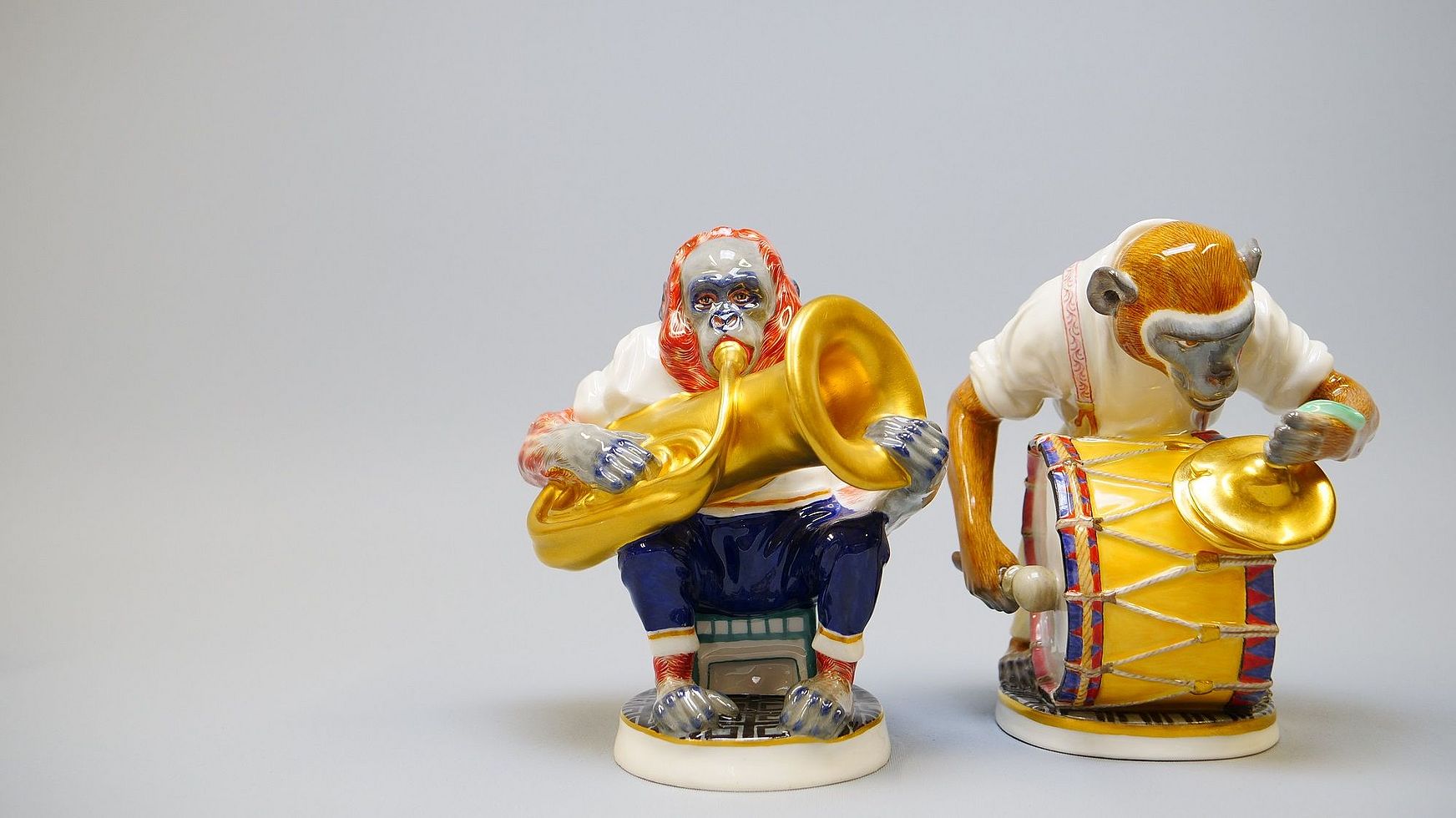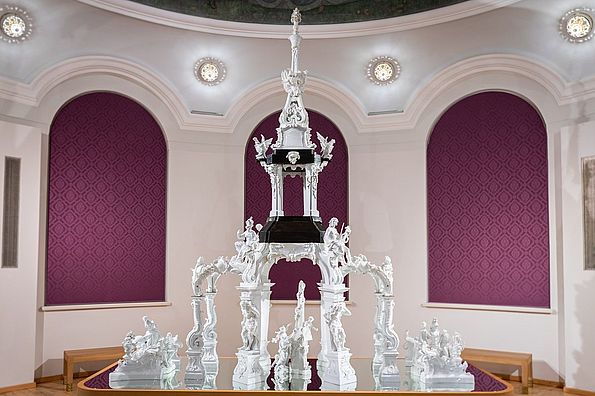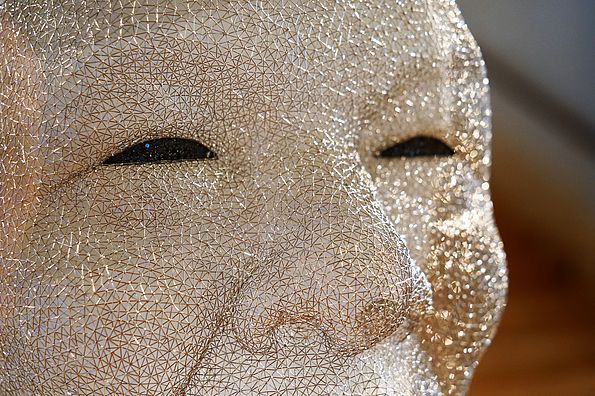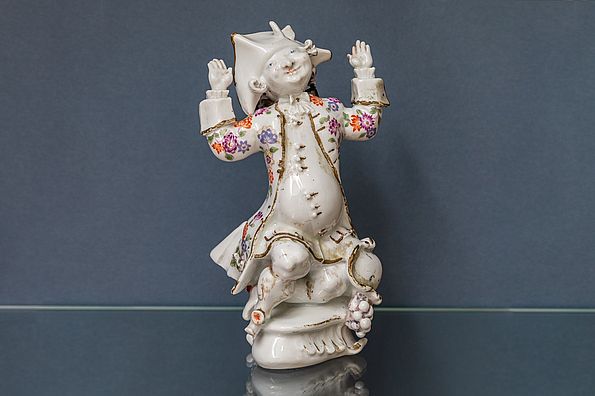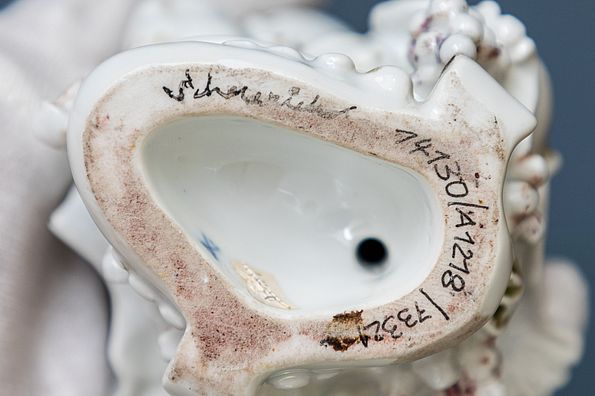Museum Knockouts
Great Temple of Honour table centre, Johann Joachim Kaendler, 1748/49
The Great Temple of Honour is a massive 11 ft 8 in tall, making it the largest item in the collection. It was modelled in 1748/49 by Johann Joachim Kaendler. It is shaped in the style of a triumphal arch and made up of 123 separate parts. It is presumed to have been used on 5 March 1749, the name day of Frederick Augustus II. All trace of the original version cast in Kaendler’s day has been lost. The present Temple of Honour was produced in 1933 to mark the bicentenary of the death of Augustus the Strong.
Nelson Mandela, porcelain, platinum and diamonds, Tom Rucker, 2010
Nelson Mandela, winner of the Nobel Peace Prize and first President of colour in South Africa, was a byword for freedom and peaceful co-existence. He campaigned for human rights, democracy and an end to apartheid, and spent 27 years in prison for his pains. So deeply impressed was Tom Rucker by Mandela’s life-story that he created a bust of the man portraying him at the zenith of his life when he was elected to become the first President of colour in South Africa. Rucker meshes tradition with hi-tech in his sculpture. The back of the bust was produced in Meissen porcelain. Rucker spent eight months welding strands of platinum a mere 0.18 mm thick together free-hand under a microscope to form Mandela’s facial features. Well over 100,000 separate filaments were required for this purpose. Tom Rucker is a goldsmith by profession and his artistic work is conducted primarily on a freelance basis. He recently won the Jacques Cartier Memorial Award, the highest accolade worldwide for extraordinary feats of craftsmanship and design. Tom Rucker lives in London and Ottobrunn near Munich.
Signed, gilt-decorated model of the Dancing Dwarf modelled by Paul Scheurich in 1929
Working with Paul Scheurich involved figure painters at the Meissen Manufactory entering new territory. Hitherto, they had “clad” their figures to a specified set of rules. Scheurich, though, set forth in great detail how he wished the figures he designed to be coloured. The prevailing “fashion” of “variations on a theme” was replaced by pinpoint haute couture. A signed model exists showing how Scheurich wished his “Dancing Dwarf” figure to be gilded. The colour is darker than would be the case with fired gilding due to Scheurich having applied watercolour to the prepared model.
Menagerie in porcelain - Do not feed the animals!
The Saxon Elector Augustus the Strong was driven by a vision of creating a palace for porcelain. A building known originally as a Dutch and subsequently as a Japanese palais was earmarked for conversion to this end. His comprehensive collection of Chinese and Japanese porcelains was to go on show here together with porcelains from his own manufactory. Menageries – enclosures containing a collection of domestic and exotic animals – had been deemed essential to any palace ever since the days of the Italian Renaissance. Other forms of keeping animals such as fish zoos or pheasant-houses were likewise common sources of prestige at the royal courts of Europe. Augustus the Strong planned a menagerie of life-size Meissen animal sculptures for his Japanese palais. Johann Gottlieb Kirchner and Johann Joachim Kaendler modelled large numbers of animals for inclusion in this porcelain zoo between 1730-1736. They readied themselves for the task by consulting the royal cabinets of artistic and natural curiosities and studying animals at the Hunting and Bear House or the game reserve at Moritzburg Hunting Lodge. The artists could only have known of the more exotic beasts they modelled from descriptions or graphic sources, however. Besides constituting a marvellous portrait of the proud fowl, Kaendler’s peacock is well over three feet tall, a towering example of porcelain production. He designed its fan so skilfully that it does not sag when fired.
